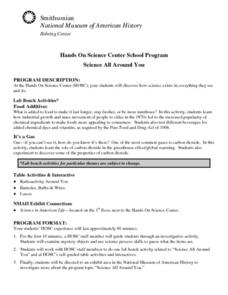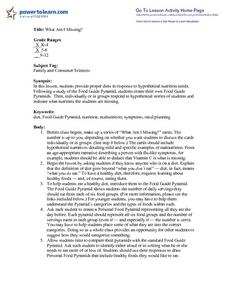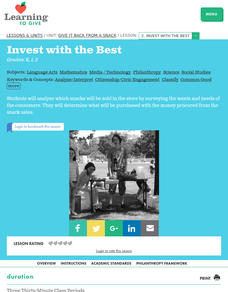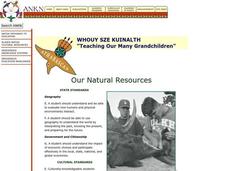Baylor College
Bio Build-up
Trace pollutants through the environment in the seventh lesson of this series on the science of food. Looking at a picture of the plants and animals in an aquatic ecosystem, learners use dot stickers to represent harmful chemicals as...
Baylor College
Plant Parts You Eat
Plants provide a variety of delicious foods essential for human survival. In the fourth lesson of this series on food science, young scientists investigate common fruits, vegetables, and grains in order to determine which plant part is...
Purdue University
Eco-llapse
A balanced ecosystem doesn't mean balanced populations. Budding scientists complete a series of activities to learn about the relationship between producers and consumers in an ecosystem. They complete the wildlife conservation...
Purdue University
What a Waste of Food!
Follow the life of an apple from harvest to the consumer. A three-part lesson describes the different steps to get an apple from the farmer to your kitchen and the approximate waste that happens at each step. They discuss the process and...
National Wildlife Federation
Habitat Web
Young scientists weave together an understanding of ecosystems with this fun collaborative activity. Taking on the roles of different living and non-living elements of specific habitats, learners use a ball of yarn to create the web of...
Baylor College
Do Plants Need Light?
Turn your classroom into a greenhouse with a lesson on plant growth. First, investigate the different parts of seeds, identifying the seed coat, cotyledon, and embryo. Then plant the seeds and watch them grow! Measure the new plants...
Curated OER
Science All Around You
Students visit and explore a Hands On Science Center (HOSC). They participate in a variety of self-guided table exercises and observe as scientists demonstrate various scientific principles.
Baylor College
We Need Water
There's nothing quite like a glass of ice-cold, freshly squeezed lemonade. Lesson seven of this series explains how the water humans need to survive can come in many forms. Teach your class about how much water humans require every day...
Purdue University
Mammal Food Webs
You are what you eat—or at least a part of what you eat. Budding scientists examine owl pellets to develop their own food webs. They use tooth and skull identification techniques to classify what they find.
Curated OER
Marshland Ecosystems
Students identify animals in ecosystem depicted on 16th Century ceramic basin and classify them as herbivores, carnivores, or omnivores based on physical characteristics and prior knowledge, determine which life forms in ecosystem are...
Curated OER
Using computers in the content area
Students practice grade appropriate computer basics and integrate them into the curriculum areas. in this technology lesson, students understand correct behaviors while using the computer. Students become familiar with the Internet and...
Curated OER
Want to Save a Sheep This Season?
Students investigate facts about sheep. They watch a video about the sheep industry. Students research practices in the wool industry. They discuss alternatives to wool. Students participate in humane education activities.
Curated OER
What Am I Missing?
Discuss nutrition and identify components of a healthy diet, view a Food Guide Pyramid, and create a Personal Food Pyramid, listing all foods eaten in the past 24 hours. Compare food lists with the standard Food Guide and determine where...
Indian Land Tenure Foundation
Native Foods and Livelihoods
Introduce young scholars to the ways in which land and people have a relationship. They examine the types of food local tribes have traditionally consumed and ways in which the people and the land both benefited from the act of...
Curated OER
Give It Back From a Snack Lesson 2: Invest With the Best
Students survey schoolmate as to what type of snacks they would prefer to purchase. They graph the results and apply them to planning a classroom snack sale while examining what wants, needs, and consumers are.
Curated OER
Let's Start Growing
Students investigate how a tree grows from a seed. In this plant biology lesson, students use potting soil, tree seeds, and a paper cup to observe seeds growing into plants. Students record observations in their science journals.
Curated OER
Our Natural Resources
Students discuss key terms used to describe ecosystems and how humans are altering natural resources. They listen to the book, Grandfather's Wisdom, and list the renewable and nonrenewable resources they have used or consumed in the past...
Curated OER
Arkansas: A Natural State
Here is a wonderful lesson plan on natural resources found in Arkansas which is designed for kindergartners. The lesson plan could be easily adapted for any state. Some clever in-class activities, games, and a song are included in this...
Michigan State University
Friend or Foe?
What one person thinks is a pest may not be a pest to someone else. Here, scholars examine the characteristics of living things and pests through grand conversation and a variety of activities. Class members play a game of pest or not a...
Curated OER
FROM FARM TO TABLE
In this cutting and pasting activity sheet, learners are given illustrations of 6 products from farms. They are asked to cut out a corresponding source and paste it to the product (i.e., milk / cow).
Curated OER
Human and Natural Made
Students compare human and natural made objects. In this science lesson, students identify items that are made by humans and items that are natural.
Curated OER
Wow! It's A Cow!
Students use the Internet to visit a dairy farm and watch the ins and outs of the every day life of a dairy cow. They survey products that are consumed that come from a cow. The students determine in what states cows would most likely...
Curated OER
A Teeth Changing Experience
Students research human health by reading an educational story in class. In this oral health lesson, students identify the importance of brushing their teeth and consuming calcium. Students read the book A Teeth Changing Experience and...
Other popular searches
- Family and Consumer Sciences
- Family Consumer Science
- Consumer Science Foods
- Consumer Science Manners
- Health and Consumer Science
- Consumer Science Fibers
- Consumer Science Fibres
- Fm & Consumer Science
- Family & Consumer Sciences
- Consumer Science Fib Res
- Consumer Science Careers
- Food and Consumer Sciences

























